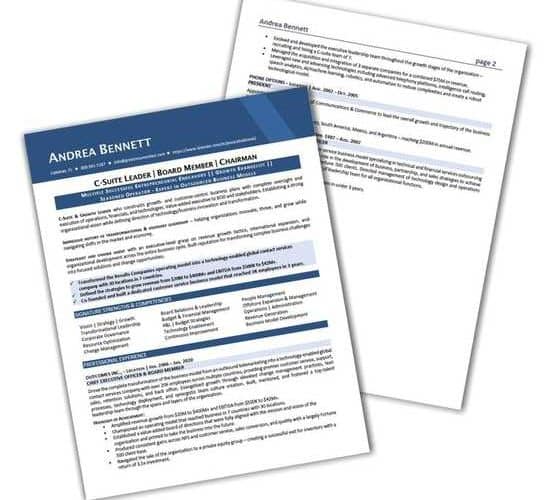There are distinct formats for resumes that you should know and integrate when creating one. They are industry standards for many different fields, so not following them might put you behind other job seekers.
If you’ve never written a resume before, then hire an expert from a resume writing service to craft a document that will stand out from your competitors. Your aim is to beat applicant tracking systems and catch the attention of recruiters. Professional assistance will make it much easier.
Moving along, here are the best resume formats that you should be using now.
#1. Reverse-Chronological Resume
A reverse-chronological resume is a format that emphasizes your experience to make you look like a seasoned professional. Here are its main features.
- A layout that highlights previous work experience in detail, usually showcasing quantifiable and unquantifiable achievements. This kind of resume also defines in clear terms what duties and tasks you had in each position.
- The most recent job will be located at the top of the experience section. It’s followed by your previous job and then the roles you occupied before.
When Is It Beneficial to Use This Format?
It’s most advantageous to use this format when you apply for a job that values work experience. It is more suitable for job seekers who have no gaps in their resumes. Those who don’t have several previous jobs to brag about should opt for the other resume formats.
This format easily presents someone’s work history through its layout. If solid experience is what it will take to impress the company you’re applying for, then go for it. It is also a better choice for those who want to land a role in the same industry and climb up the career ladder.
#2. Functional Resume
A functional resume is different from a reverse-chronological one in that it tries to highlight skills instead of work experience. Here is what you should emphasize in your functional resume.
- Highlight your soft and hard skills, achievements, and relevant voluntary work. Functional resumes usually include bullet points to break down skills and categorize them. Soft skills include all qualities that are not tangible, such as character traits that are necessary to succeed in a job. Hard skills are all skills that can be proven right away, like working with certain software.
- Accomplishments and voluntary work can also be broken down into bullet points when possible. The resume format’s aim is for recruiters to focus on qualifications instead of experience.
When Is It Beneficial to Use This Format?
As you’ve already guessed, this format is the right choice for those who don’t have much work experience. However, it is also advantageous for job seekers who are changing occupations or those who have gaps in their career history. Moreover, it is applicable to those who want to change industries altogether.
If you already boast solid work history, it’s best to use the other formats.
#3. Hybrid/Combination Resume
This type of resume tries to highlight both work experience and relevant skills and expertise. In this case, you should find a middle ground and briefly mention all the aspects that make you a great fit for the job.
Typically, with this format, the right way to showcase achievements is by placing them at the top, after the summary or objective. Then, you list relevant skills and describe your work history.
So, to make that clear:
- Hybrid resumes include lists with relevant and transferable skills;
- They present your work experience in reverse-chronological order;
- The resume tries to balance both instead of emphasizing one section more than another.
When Is It Beneficial to Use This Format?
This format is most advantageous to junior and mid-level applicants with important skills that match the job they’re applying to. The combination resume is best used when you have a few years of experience and can mention the skills that will make you stand out from other candidates.
It can also be a good format for those who want to break into a new industry and when applying to jobs requiring many technical skills. If you want to emphasize accomplishments and having executed many job duties, you should try this format.
Final Thoughts
When it comes to resumes, it’s better to do your research and see which category you fall into before choosing a format. As you’ve seen in our categorization, it depends on your particular situation, strengths, and weaknesses.
A good rule of thumb is to tailor your resume and cover letter to each job application. However, you don’t need to change formats every time; it might be good to have templates ready. Keep in mind that reverse-chronological resumes are still better off for experienced workers. So, if you’re fresh out of college and only starting to look for your first job, it’s best to opt for a functional one.






